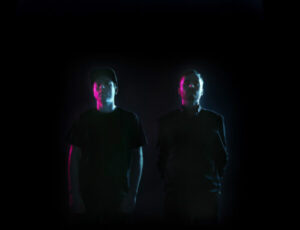Music as an art form has been associated with sexuality for a long time. Maybe it’s because listening to music is necessarily a sensual, bodily experience – sound literally has to move the human eardrums in order to have any effect. Maybe it’s the element of rhythm, which is the link between music and dance (another oft-sexualized art form). Or maybe this is just my rock’n’roll-era brain trying to fit the whole of music history into my box.
Stupid, sexy Elvis.
Even if only for that reason, music is a powerful medium for examining the topic of sex, along with other related issues like identity, relationships, and the broader human experience. Such is the goal of Kinnie Starr’s new album, Kiss It. Entirely produced by Starr herself, Kiss It takes stylistic cues from hip hop and electronic, and melds them with her singer-songwriter sensibilities.
From what my ears can hear, the only real instrument used on this album is Starr’s voice. Actually, her vocal performance is one of her biggest strengths. She displays a wide range of expression, molding her pitches and timbres into interesting shapes and textures to create a sense of drama and novelty. She’s also a fairly competent rapper, as is called for on a few tracks, though she’s more poetic than street. I meant it when I referred to her voice as an “instrument”, as she has clearly developed her techniques to wield it as an effective artistic tool.
As far as the songwriting goes, there are no boring moments, as Starr keeps her compositions moving without an excessive amount of repetition. In fact, there’s a constant sense of playfulness in her music, which is a highly endearing quality. But playfulness is the virtuous counterpart to the vice of juvenility, which unfortunately is also present on Kiss It. It’s most apparent in the lyrics on a few particular tracks (namely “Home Is Everywhere”, “Go Go See It”, and “Everything Changes”), where she tackles topics like the meaning of ‘home’, postmodern epistemology, and the effect of social changes on human relationships and creativity. These are hardly new questions, and in all honesty, Starr simply lacks the literary and intellectual finesse needed to approach them in a fresh way.
On the other hand, she displays a lot more sophistication when exploring the earthier themes of relationships and sexuality, the best examples being “Kiss It”, “Body Like A Queen”, and “Mean Machine”. Starr comes across as more worldly and authentic on these tracks, making them significantly more engaging for the audience. They’re also the catchiest on the record by far, worth a listen in their own right.
However, there was a bigger letdown. I don’t know the reason for Starr’s choice to self-produce, but I’m not confident that it was the best artistic choice. Electronic music has been around for over a century now, predating rock’n’roll, hip hop, and arguably even jazz. It’s a world filled with infinite artistic possibilities, a playground for sonic scientists, and it has rapidly matured and found its way into all genres and scenes. Popular interest in music made with electricity has seen a particular resurgence in the past decade, whether it’s EDM, IDM, Top-40 pop, indietronica, or… whatever you call Death Grips.
All this to say, Starr is working against a backdrop filled with some truly great production achievements, and I’m sad to say that she doesn’t quite measure up. The arrangement and sound design choices on Kiss It betray Starr’s otherwise artistically adventurous attitude, as well as her apparently strong sense of identity. As a sonic experience, it fails to make a strong impression sitting somewhere between too little and too much. A more understated aesthetic could let the songs speak more clearly, as well as giving an alluring feeling of mystery. Or, something more aggressive and edgy would grab the listener’s attention, demanding both an emotional and bodily response. Surprisingly, it wasn’t even particularly sensuous for the most part. For the majority of the album, I found myself wishing for a stronger statement of musical character.
For a record whose title track is literally about playful and romantically engaging titillation, Kiss It is not nearly as exciting as I’d hoped. While Kinnie Starr is an artist possessed of potentially incendiary talent, it seems that it hasn’t quite fully ignited yet. I’ll hold out a little hope yet that Starr has something to be unlocked – maybe by an experienced and sympathetic producer, or a live band with whom she can gel. Maybe next time.










